

THE GOSPEL IN ACTION:
DEFINING AND LIVING GOSPEL JUSTICE
THIS ISSUE
The theme of this spring’s Colorado Episcopalian magazine, “The Gospel in Action: Defining and Living Gospel Justice,” invites us to reflect on how Jesus’ teachings shape our understanding of justice, mercy, and compassion. Rooted in Episcopal values, it challenges us to address issues like poverty, racial inequity, environmental stewardship, and political division through faith-driven action. This edition explores how Gospel justice moves us from belief to discipleship, highlighting stories of Episcopalians living out their faith to transform their communities.
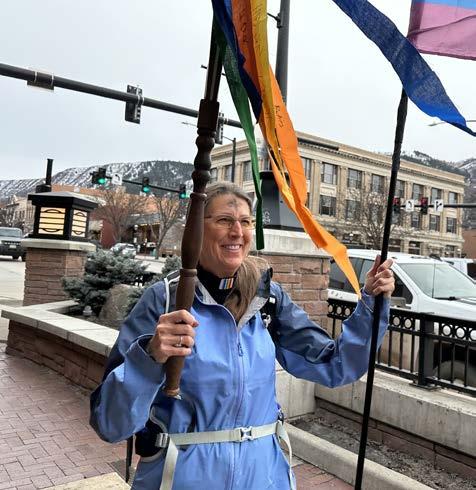
“Coming together in the spirit of justice, compassion, and love… is something we want to continue to stand up for.”

“Living into these baptismal promises requires more than good intentions; it requires deep spiritual work and engaging our faith for the sake of others.”


JUSTICE, JUSTICE SHALL YOU PURSUE: A CALL TO FAITHFUL ACTION
BY BISHOP KYM LUCAS
“If you do away with the yoke of oppression, with the pointing finger and malicious talk, and if you spend yourselves on behalf of the hungry and satisfy the needs of the oppressed, then your light will rise in the darkness, and your night will become like the noonday.” – Isaiah 58:10
Several years ago, a friend gifted me a watercolor of Hebrew characters that says, “Tzedek, Tzedek, Tirdof,” which translates to “Justice, Justice shall you pursue.” The words come from the book of Deuteronomy, and according to Rabbi Bradley Shavit Artson, these words constitute “one of the eternal religious obligations of Judaism.”
This painting sits on my office bookshelf, at eye level when I sit at my desk. I say those words every morning before my workday, tacking on “I will with God’s help.”
The obligation of the faithful to pursue justice is echoed not only by the prophets but also in the teachings of Jesus. In the sermon on the plain, Jesus
Jesus teaches that true justice is not retribution; justice is about compassion, mercy, accountability, and restoration. Justice is not only about individuals but communities, societies… and the whole world.
teaches that true justice is not retribution; justice is about compassion, mercy, accountability, and restoration. Justice is not only about individuals but communities, societies… and the whole world. For far too many of us, raised with the myth of rugged individualism, our faith gets reduced to our personal relationship with God. This understanding misses a key part of the greatest commandments we’ve been given, which are: 1) Love the Lord your God with all your heart, with all your soul, and with all your mind and 2) love your neighbor as yourself.
These two commandments are not an “either/or” proposition. They are intrinsically linked, as one cannot love God and hate their neighbor; likewise, one cannot truly love their neighbor if they have not known divine love.
Because the Church is called “to restore all people to unity with God and each other in Christ,” our faith cannot be limited to an individual’s piety. Author Mark Vander’s book, Justice: Not Just Us reminds us that true justice is not about the wellbeing and flourishing of a few. It is about all of us working to end oppression and exploitation in all its forms. Justice is about every person having what they need, not simply to survive but to thrive. And in seeking justice, we cannot forget that injustice anywhere is a threat to justice everywhere (MLK Letter from a Birmingham Jail).
We Episcopalians are reminded of this whenever we renew our baptismal covenant as we promise to “strive for justice and peace among all people and respect the dignity of every human being.” Our lives, the practice of that faith, must include making the world a just and righteous place for everyone.
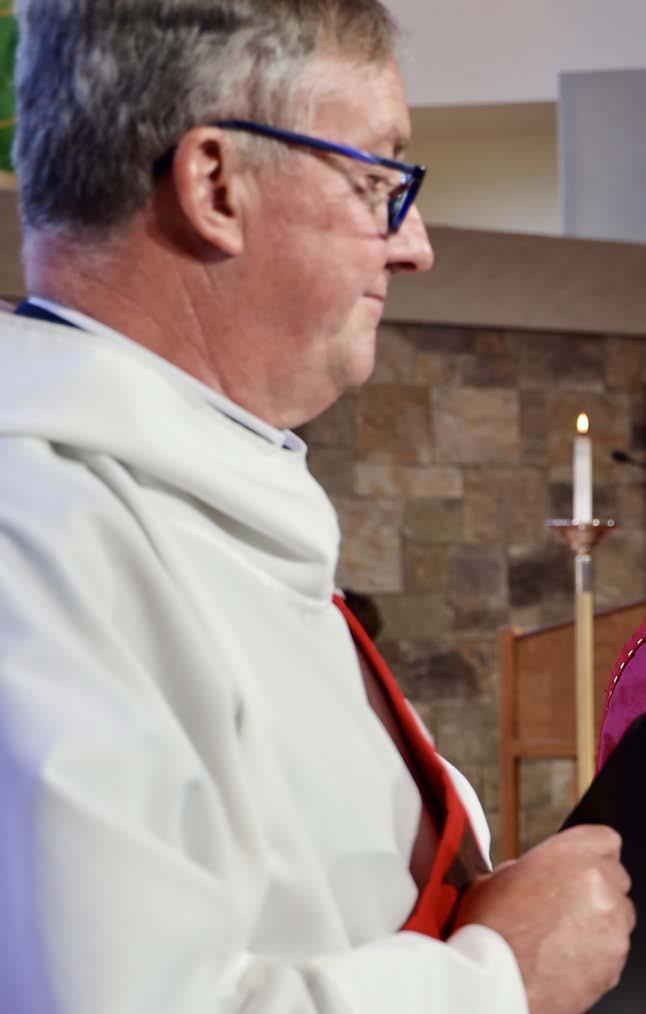
True justice is not about the well-being and flourishing of a few. It is about all of us working to end oppression and exploitation in all its forms. Justice is about every person having what they need, not simply to survive but to thrive.
FORMING DISCIPLES: THE HEARTBEAT OF GOSPEL JUSTICE

BY THE REV. CANON GREG FORAKER
The work of formation is at the core of our discipleship as faithful Christians.
Bishop Kym is fond of saying, “Everything is formation.” Both individually and communally in our parishes, missions, and communities, formation is about grounding ourselves in our why—the deep, abiding call to love and follow Jesus. It is not simply about gaining knowledge or skills but about becoming the
kind of people who can respond to injustice with wisdom, compassion, courage, and love. It is how we, as followers of Jesus, are continually shaped, nurtured, and empowered to live out our baptismal covenant in the world. When we are baptized, we enter into a sacred promise—to seek and serve Christ in all persons, to strive for justice and peace, and to respect the dignity of every human being. In this promise, we find the foundation of Gospel justice. But living into these baptismal
promises calls for more than good intentions; it requires deep spiritual work and engaging our faith for the sake of others. This is the heart of formation.
Across the Episcopal Church in Colorado, Christian formation welcomes all. From the faithbuilding Quest youth retreats, summer camps, and children’s programs that nurture the next generation of Christians, through immersive faith-deepening retreats and gatherings for all ages at Cathedral Ridge, to
Bishop Kym confirms a young man at St. Michael’s Episcopal Church, Colorado Springs. Photo courtesy the Rev. Matt Holcombe
pilgrimages, whether near or far that expand our spiritual horizons and empower us to live even more fully into God’s call to us, formation takes many shapes and is offered to people of every age and every stage of faith. In all these ways, faith grows and disciples are energized to live out Jesus’ teachings. And, always, further paths to live more deeply with God are revealed.
Spiritual growth, discovering and exploring the deeper questions of life, happens in moments of discernment—both for lay leaders discerning how God is calling them to serve in their communities and for those called to ordained ministry. Formation happens in the life-changing acts of confirmation, reaffirmation, and reception as individuals claim their faith with renewed commitment. Formation happens in clergy gatherings, conventions, and workshops, where we are challenged to learn, grow, listen, and respond to the needs of the Church and the world.
Across the church in Colorado, we live our faith and gather together in mission and ministry in a remarkably wide range of communities and realities. Our parishes, missions, and ministries exist in rural, mountain, resort, suburban, and urban settings, and even among these five broad categories, there is nearly endless variety. Formation is the source of our collective work as a diocese and in the Office of the Bishop, equipping and empowering God’s people to engage with the world as agents of transformation.
Every Episcopal community uniquely engages its surrounding context based on its gifts, capacities, and vision.
Living into these baptismal promises requires more than good intentions; it requires deep spiritual work and engaging our faith for the sake of others.
Communities are engaging deeply in the realities of their unique contexts. All Saints, Loveland, sought to become a still more welcoming and inclusive community through their Believe Out Loud work. Now, they are experiencing a new vitality as their congregation thrives and grows in ways never imagined. Meeting the Colorado Springs community where needs are greatest, St. Michael’s has responded through Laundry Love to ensure that low-income neighbors have clean clothes, washed bedding, and most of all, dignity. St. George, Leadville, has transformed its mission and ministry, focusing on providing meals and a food pantry to the community each week, ensuring vital food access and strengthening the community with huge results.
Through these engagements, each congregation is exploring how Gospel Justice challenges us all to engage with societal issues—poverty, racial inequity, economic disparity, environmental stewardship, and political division— through faith-driven action. Discernment happens when we engage in this formative work.
As our Episcopal communities identify and discern their gifts, they may celebrate longvalued traditions and ministries or discover inspiring hidden or not previously recognized opportunities among their
members. This work of individual and communal discernment has the potential to challenge earlierheld ideas about a congregation and holds far-reaching possibilities for inspiration and revitalization both in nurturing deeper engaged faith among members and engagement in the wider community amid the current and emerging realities of today.
Through this discernment, questions will inevitably emerge: How can we better identify our gifts? How can we learn where to reach out to our wider community? How can we determine what our capacity for community engagement is at this time in the life of our congregation? How is God calling us to step out in faith to respond to the crying needs of our broken world?
Reflecting on TheGospelinAction: DefiningandLivingGospelJustice, we recognize that formation is not just preparation for justice work— formation is justice work. When we create spaces for learning, discernment, and spiritual growth, we build communities where every person is seen, valued, and called to contribute. When we invest our energies in deepening formation of faith, we are investing in a Church that is not only grounded in the Gospel but actively living it.
THE REV. CANON GREG FORAKER is the Canon for Formation and Pastoral Care for the Episcopal Church in Colorado.
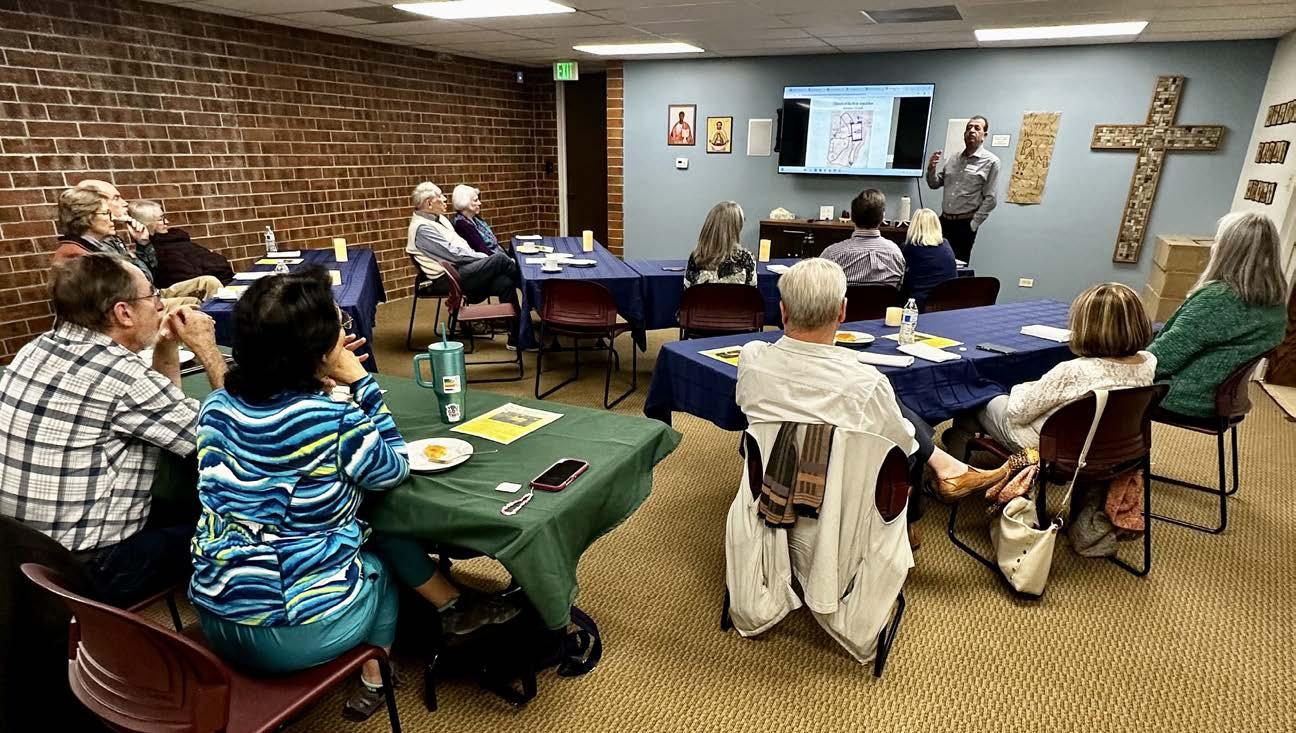
Gospel in Action: Dialogue as a Practice of Discipleship
BY THE REV. AMY NEWELL-LARGE
Jesus’ words in Luke 6:27-38 are challenging:
Love your enemies, do good to those who hate you, bless those who curse you, pray for those who mistreat you.
Most of us don’t think of ourselves as having “enemies” in a dramatic sense. But we all encounter difficult people—those who frustrate us, those we avoid, those whose views clash with ours. In today’s world, the political “other” often feels like an enemy.
While I pray daily for those I struggle with, I have also learned that dialogue is a skill—something we can practice, refine, and use to engage meaningfully rather than retreat into avoidance or polite small talk. In my graduate studies at Naropa University, I focused on interreligious dialogue and discovered that it isn’t about winning debates or forcing
agreement—it’s about opening space for connection, even when we disagree.
DIALOGUE AS DISCIPLESHIP
Jesus never waited for everyone to agree before forming relationships. He sat with tax collectors, sinners, and the Samaritan woman—showing us that we cannot pause until we are comfortable with building community. We are called to love now, not after political or theological alignment is reached.
Dialogue is a practice of discipleship—a way of breaking down barriers for the sake of connection. It pairs Jesus’ call to radical hospitality with active listening. Many resist engaging with the “other” because they assume they must agree, argue, or tolerate something that deeply offends them. None of that sounds comfortable—and it isn’t.
It’s much easier to stay in an echo chamber, surrounding ourselves with people who reinforce
Iyad Qumri talks about the Holy Land with virtual pilgrims.
Photo courtesy the Rev. Canon Greg Foraker
our views. But the world is filled with beloved children of God who see things differently than we do. Jamil Zaki, in Hope for Cynics, notes, “People fear and loathe rivals—and increasingly avoid them… as people interact less across political lines, we lose real-world knowledge about rivals… Both Democrats and Republicans imagine rivals are more extreme than they really are, a pattern researchers call ‘false polarization.’”
What do we risk when we refuse to engage? We risk relationship. We risk community. We risk love. Jesus tells us to love even in difficult circumstances because love brings us closer to God. Are we willing to miss out on love because of political division?
THE BAPTISMAL CALL TO SEE CHRIST IN ALL
My own commitment to seeking Christ in all people is what anchors me in this work. I refuse to live a life of isolation, and I believe community is essential for all of us. Our baptismal imagination allows us to envision a world where we respect the dignity of every human being—and dialogue is one way we make that vision real.
Most of us can’t afford to wait until family members vote the same way we do before we share Thanksgiving dinner. So, how do we engage meaningfully across differences?
GUIDELINES FOR GOSPELCENTERED DIALOGUE
These guidelines, adapted from The Dialogue Institute, provide a framework for engaging well. Even when we can’t formally ask others to follow the same guidelines (for instance, at a tense family gathering), keeping them in mind helps us remain grounded.
1st Guideline: The purpose is to learn and grow. Dialogue is not about forcing change—it’s about deepening understanding. If you’re unwilling to learn from the other person, notice that in yourself and reflect on it before entering dialogue.
2nd Guideline: Commit to honesty, respect, and sincerity. Ego posturing and condescension have no place in dialogue. You can ask, “This conversation is getting deep, and I respect you. Can we agree to hold that respect for one another as we continue?”
3rd Guideline: Let people define themselves. An
Jesus never waited for everyone to agree before forming relationships.
Episcopalian cannot define Catholicism for a Catholic, nor can a Democrat define Republican beliefs (or vice versa). Let people speak for themselves.
4th Guideline: Don’t assume where disagreement will arise. Listen with openness and curiosity. Agreement may extend further than you expect. Stay open until your integrity requires you to disagree—not before.
5th Guideline: Notice power dynamics. Dialogue works best when participants engage as equals. If differences in age, role, or authority exist, be mindful of how they affect the conversation.
6th Guideline: Trust is key—and it takes time. Trust allows for deeper honesty and vulnerability. Dialogue both builds trust and grows through trust.
7th Guideline: Be self-critical and reflective. If we believe our group already has the right answers, we violate the first guideline. While we should maintain integrity and conviction, true dialogue requires selfreflection and openness.
PRACTICAL TOOLS FOR MEANINGFUL CONVERSATION
Alongside these guidelines, here are some simple strategies for engaging in difficult conversations:
1. Start with Appreciation. Trust is built through gratitude.
• “I appreciate you sharing your thoughts on this.”
• “Thank you for being open with me.”
2. Use “I” Statements. Speak from personal experience rather than making absolute claims.
• Avoid: “Everyone knows that...”
• Instead, try: “In my experience, I’ve found that...”
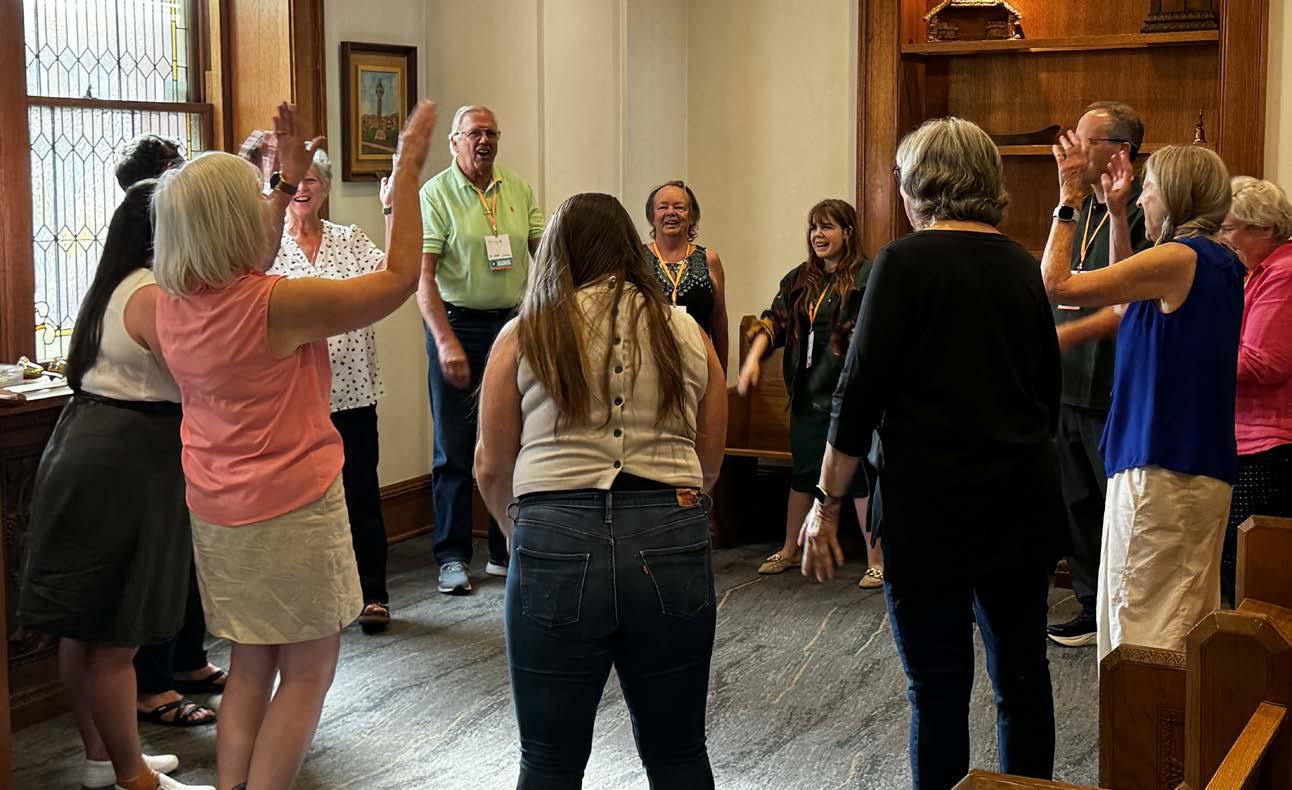
3. Reflect Back What You Hear. Reflective listening ensures you understand the other person correctly and models respect.
• “I hear you saying that ____. Is that right?”
• “I want to make sure I understood—can you clarify what you meant by ____?”
These small shifts in how we listen and respond can change the tone of a conversation entirely.
A CALL TO ACTION: PRACTICING GOSPEL DIALOGUE
Dialogue is not about winning an argument—it’s about showing up with love. It is about breaking down walls and building bridges of understanding, even when full agreement is impossible.
So, I challenge you:
• Have one meaningful conversation this week with someone whose views differ from your own.
• Listen with the intent to understand, not to reply.
• Look for Christ’s light in them—even when it’s hard to see.
This is how we put the Gospel into action. This is how we live into the discipleship of dialogue, not by avoiding the hard conversations but by entering them with grace, humility, and a heart open to transformation.
This is how we put the Gospel into action— by entering the hard conversations with grace, humility, and a heart open to transformation.
THE REV. AMY NEWELL-LARGE is the Rector at St. Matthew’s Episcopal Church, Parker.
Relational Communications workshop at the Caffeinated Church Conference, led by the Rev. Dr. Dee Cooper, Lead Presbyter of the PCUSA Denver Presbytery.
Photo courtesy Canon Mike Orr
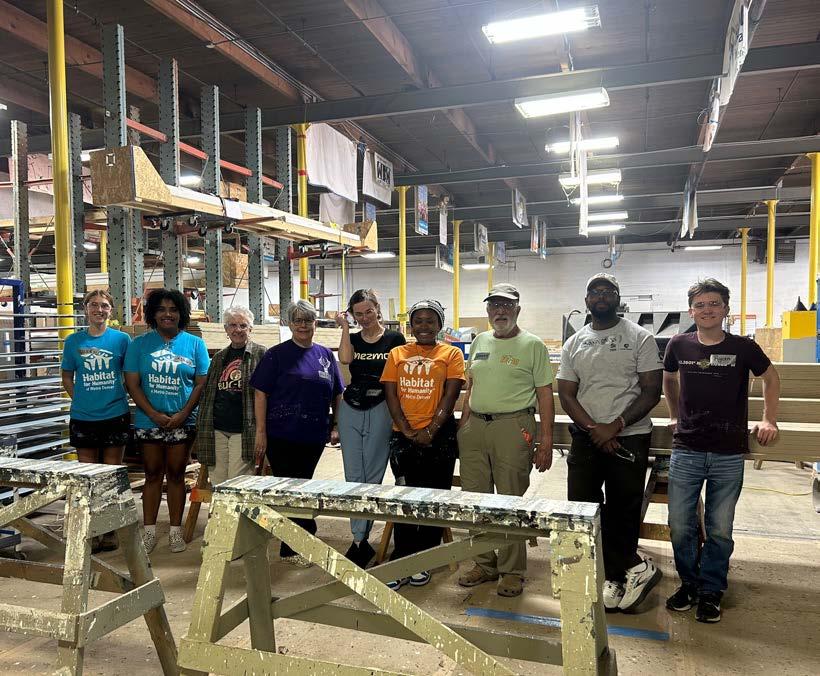
DIAKONIA AS A WAY OF LIFE
DEACONS
LEAD US INTO LIVING THE BAPTISMAL COVENANT
BY THE REV. HAILEY MCKEEFRY DELMAS
Sometimes, people ask me about my ministry as a deacon. They want to know what my ministry is. When I first became a deacon, I might have said that my ministry was to the elderly. Later, I was a chaplain and walked with people suffering from life-limiting diagnoses and severe mental illness. Now, however, my answer is much different: My ministry is helping people and communities discover and live into theirministry.
As a deacon, I blow on the embers of diakonia that I find. I encourage the Christian community to live into their
calling to diakonia. That word, which comes from the Greek διακονiα, points to our calling as Christians to serve the poor and oppressed.
Every Episcopalian, at their baptism, makes a handful of promises. It’s called the baptismal covenant. We affirm our belief in God, Jesus, and the Holy Spirit. Then we promise:
• To continue in the apostles’ teaching and fellowship, in the breaking of the bread, and in the prayers.
• To persevere in resisting evil, and, whenever you fall into sin, repent and return to the Lord.
• To proclaim by word and example the Good News of God in Christ.
• To seek and serve Christ in all persons, loving your neighbor as yourself.
• To strive for justice and peace among all people, and respect the dignity of every human being.
Deacons help remind the Church and its people that we are meant to live out our baptism in the world. In practical terms, it means that as a deacon, I am shaped by my context— where the Church is, who the people are, and what they are passionate about. I moved to Colorado just over a year ago. Bishop Kym assigned me to serve at St. Stephens in September six months ago.
In that place, I’ve come to understand that we are a community that cares deeply about our neighbors. We want to offer the resources we can (food, clothes, grocery store gift cards) to those in our neighborhood who are hungry or in need. We want to be in relationship with the next generation in the neighborhood, so we have a summer camp and a “trunk or treat” at Halloween. We embrace the diversity of God’s people and celebrate that—so we look for ways to make sure that different cultures, languages, and people are represented. We are a community that makes room and welcomes everyone and anyone.
In the last community I served, we had a convalescent home ministry—we visited every week with Eucharist at a local home. That became a service that was attended by more people than
The outreach committee at St. Stephen’s spends a day with Habitat for Humanity painting siding for affordable housing in Aurora.
Photo courtesy the Rev. Hailey McKeefry Delmas

any service we offered other than our main Sunday Eucharist. We partnered with a mental health support organization called California Clubhouse to ensure that those struggling with extreme mental health diagnoses are supported to live and strive for the life they want.
As a deacon, my job is to encourage and support the community and the people of God in searching for and living into God’s dream for them and the world.
One of the challenges of being a deacon right now is that there aren’t enough of us. Many churches do not have a deacon in their midst, yet every church is called to diakonia. What should you do if you don’t have a deacon? Be the spirit of diakonia where you find yourself. Here’s how:
• Make sure the doors and windows of the church are
always open (figuratively, of course, because of heating and cooling costs). Who do you see in the place where you are?
• Be in relationship with others in your parish. The people sitting next to you likely lead amazing lives— they have skills, experiences, and ideas. Ask them about what breaks their hearts and what lifts their spirits.
• Look for where the wider community and the parish community overlap. Have a lot of teachers? Maybe you also have kids who need tutoring. Have a lot of unhoused people? Maybe you have a social worker who knows where resources are. Bakers? Well, lots of people need hospitality and welcome. Invite everyone to think about where their skills and knowledge might fill a
gap in the world.
• Don’t be afraid to invite others into the community. Sure, invite them to worship, but also ask if they want to come to the movie night or the game night. Ask if they ever feel overwhelmed by the challenges of the world. Reassure them that they can get involved and make a difference.
This is the heart of who we are and what we do: we love and serve Christ in each other. We love our neighbor as ourselves. And in my role as a deacon, let me say this: We’ve got this. It is possible. It’s doable. And God knows the world needs it.
THE REV. HAILEY MCKEEFRY
DELMAS is a Deacon at St. Stephen’s Episcopal Church in Aurora. She is also the Director of the Deacons Formation Collaborative at Bexley Seabury Seminary.
The Church Inside
BY THE REV. QUINN WILHELM
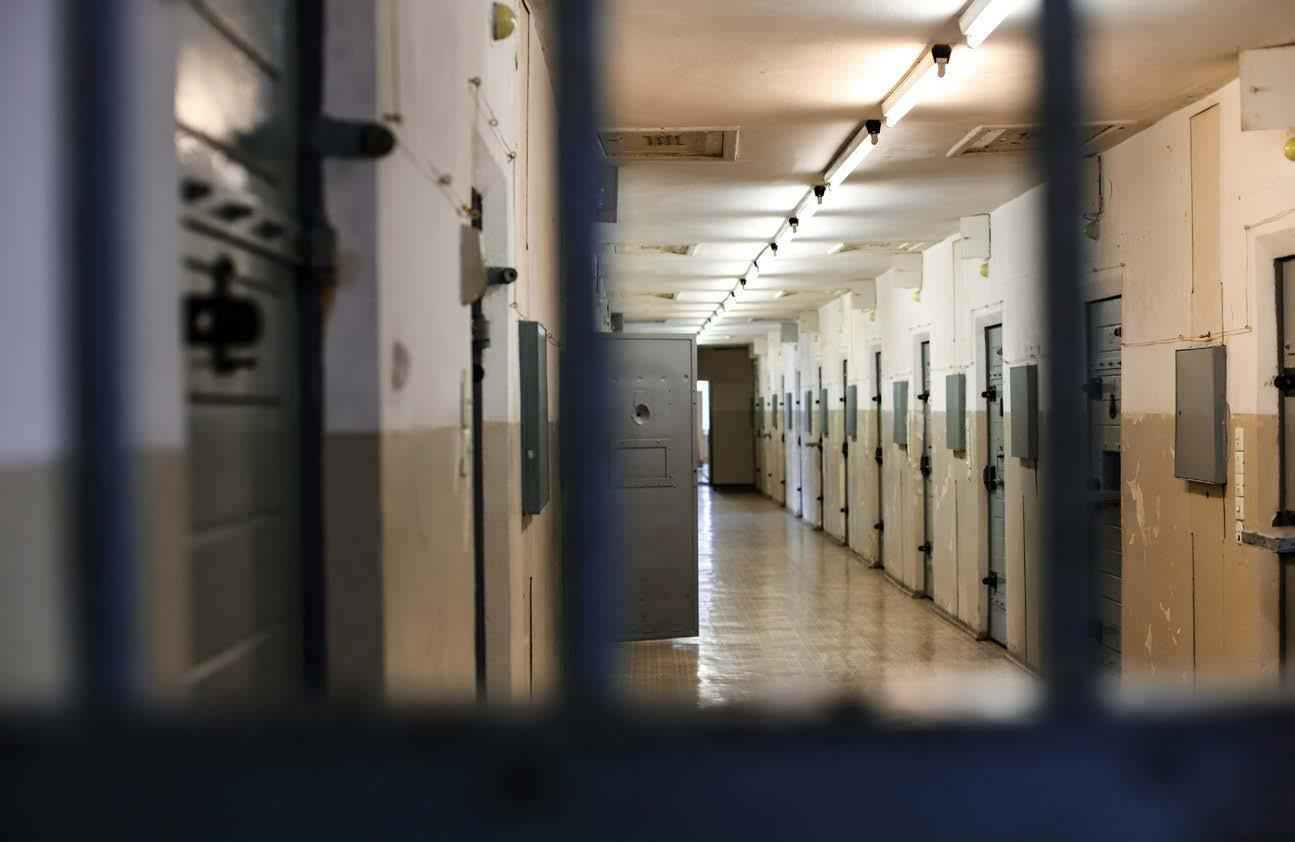
When I was a young man growing up in The Episcopal Church, in the heyday of the Charismatic Renewal movement that swept through the Church and around the globe in the late ‘60s and ‘70s, I made up my mind that I wanted to be an Episcopal priest. There was just something about the call of the Eucharist that drew me. To this day, I still love the way that Sunday morning in The Episcopal Church is structured. While the sermon is necessary and important, it takes second place to remembering what has been done for us—Christ’s sacrifice, which restores us to communion with our Creator. This act of remembrance is the true center of the Sunday morning gathering of God’s people.
With the goal of priesthood in mind, I went to college and got a degree in theology. Needing a job while I was there, I took a job with the campus police as a security guard. It was a boring job; all I did was walk around all night rattling doors and making sure the campus was all locked up. But it kept me in soda and burger money with a little left over for the occasional date.
After graduation, I went to see my mentor/hero, Bill Frey, Bishop of Colorado and my best friend’s father, to tell him that I was ready to go to seminary and become a priest. Bill wisely looked at me over the top of his glasses and asked me how old I was. I told him—I was 21. What followed was a conversation that left me with the understanding that, in truth, I was still just a punk kid and needed to grow up a little. “Get some life experience,” were Bill’s words of advice. “Come back and see me in a few years, and we’ll talk more.”
With no other ideas bursting from my eager beaver brain, I thought back to my college security days. The few number of times we needed to contact the police for some on-campus emergency left me impressed with the men and women I met from the Los Angeles County Sheriff’s Department. I decided to try to get a job in law enforcement, and several months later, I was sworn in as a rookie police agent with the Lakewood Police Department. Suffice it to say that I found a career that I genuinely loved. I loved wearing a uniform because it gave me a built-in excuse to butt into people’s lives when they
We all need God’s grace, and the ground around the foot of the Cross of Christ is level. None of us need redemption any more than anyone else.
were in trouble. And very frequently I found myself in positions to minister to people who wouldn’t have darkened the door to a church on a bet. On the street, things were real—and when I got involved in someone’s affairs, it was a pretty safe bet that they knew they were in trouble. And what’s more, they knew I knew they were in trouble. When you get to that point, pretty thick conversations tend to have few barriers.
I worked the street for 24 years and worked as a detective for another 11, nearly all of it on the colorful West Colfax corridor, a place that amongst ourselves we referred to as “The Greatest Show on Earth.” I forgot all about the priesthood, figuring I was doing some pretty gritty ministry as it was. Then, in December of 2015, I had a stroke one morning while getting ready for work, and pretty quickly I knew my days of chasing people over some back fence during the wee hours of the morning were over.
Through a series of events that can only be described as God’s hand at work, I became employed as the chaplain to the inmates at the Jefferson County Jail, the same facility where I had lodged my arrestees for the previous 35 years. Part of that divine intervention was ordination to the diaconate in The Episcopal Church. In my full-time position, it wasn’t long until I began to see the justice system through the eyes of the incarcerated and started to understand things from a much broader point of view. Once, while in the ordination process, I was charged with writing a paper on “Economic Inequalities in the Criminal Justice System.” Rather than try to wordsmith some paper that made it sound like I knew what I was talking about, I went to one of my housing units at the jail and gathered a group of my guys. I had no problem, in either of my careers, making friends with arrestees or inmates. We all need God’s grace, and the ground around the foot of the Cross of Christ is level. None of us need redemption any
more than anyone else. So, my position as a retired cop, now chaplain (“Chap Q,” a title of honor I hold dear), only helped build my influence among my “congregation.” I told them what I needed to do and asked them to educate me on this subject. As I recall, about 11 or 12 men gathered around, and over the next hour or so, I got an education. Most of my congregants are quite fluent in a manner of speech typically referred to as “profane,” but their message came through loud and clear. I went home that night understanding that I had a lot to learn.
Most of us have grown up in homes where there might have been some kind of struggle or maybe even someone who struggled with addiction or some level of abuse. But many of the people God has placed in my care have horror stories that are simply staggering. One told me of a time when he was about 12, and his father decided he needed to “toughen up and be a man” after a verbal tonguelashing left him in tears. Grabbing his son, his father dragged him outside and, using a pair of handcuffs, clamped him to a clothesline pole and threw baseballs at him. Another young woman spoke of delivering meth for her mom’s business in their neighborhood when she was 8. Later, when she was about 13, she began to use meth alongside her mother. When she turned 15, her mother began to trade her to other addicts for sexual use. Running away was her only hope of surviving. I spoke to a young man last week whose record included living in 17 different foster homes growing up and how he was sexually abused in two of them. Still another spoke of growing up in a devout Catholic family, only to be sexually abused by one of the clergy as an acolyte here in Colorado. Sweat poured from his face while he haltingly spoke of this to me, never making eye contact his head down, staring at his own sweat and tears dripping on the floor. In my jail, incarceration connected to addiction to escape from the realities of life is rampant. And yet, truthfully, it is here, in jail, that so many find freedom. If I were to ask two questions of every
individual in my jail and that number has been as high as 1300-1400 average daily population during my tenure the numbers of affirmative answers would simply stagger most believers. The questions are these:
1. At some point in your life, have you ever heard God’s voice speaking to you, and have you responded to it in some way, trying to amend your life?
2. Do you sincerely believe that while the police arrested you, God somehow architected the circumstances because God saw the selfdestructive way you were living and drew you out of that so you could, now that you are clean, sober, fed (maybe not well-fed, but fed), and have a bed to sleep in, begin to listen and hear God’s voice calling you again?
Jesus said in Luke 7:47 that, “He who has been forgiven much, loves much.” How many times have I seen this verse of scripture being lived out right in front of my face? In my ministry here, I simply preach the Gospel. I tell inmates their past does not matter; they have worth in the sight of God that is not colored by the length or contents of their rap sheets and that the redemption offered by Christ is real and is not circumstantial. They don’t need to carry the burdens of the past or the present and for many who are headed to prison for long periods of time, the future. And God’s plan of redemption, as revealed in the pages of scripture, is absolutely true. Psalm 69:33 reads, “For the Lord hears the needy and does not despise His own people who are prisoners.” Prisons come in many shapes and sizes some are made of concrete and steel, and some are in our minds. For many of my people, it’s both.
I have a staff of volunteers who teach Bible studies and conduct church services. And as I developed my staff and programming, I asked God for people who
really understood the need here. And God brought them. Nearly half of my staff have done time in some jail or prison and understand the need for the redemptive change on the inside of a person that the Gospel brings. They understand that until God sets someone free from their past, changing their environmental circumstances is only of limited value what good is it to change a person’s living situation if they bring their old destructive way of life into it? And the Gospel message, when we understand and embrace it, does just that. One of my guys said it pretty accurately; his name was Rudy (not his real name…). Rudy said, “This dude Jesus let them other dudes kick his ass so I could be like, you know, cool with God. How can I dis the dude by ignoring what he did like it didn’t happen? I gotta get me baptized, Chap.” And baptize him we did, the next day, right in his housing unit. Six of his fellow inmates were there to offer their respect and witness the step Rudy was taking.
There are generally three kinds of people in jail the first are people who do what they do for a living, and coming to jail is just part of the cost of business they have no intention or interest in changing. The second are people who realize they have lost control of their lives in some way and have hit bottom. And the third are those who don’t realize how desperate their situation is yet and think they can somehow fix their lives themselves. For those who have hit bottom, they realize that something has to change, and they cannot do it alone. And the desire to change is near the heart of repentance. Knowing you cannot do it alone is when you reach out. What did Jesus say when he began his earthly ministry? “Repent and believe.” God’s presence, I believe, is found among those where God is most wanted, among those who have the audacity to believe what Jesus said and take what He offers at face value. A story from early in my chaplain career is an example:
Prisons come in many shapes and sizes—some are made of concrete and steel, and some are in our minds. For many of my people, it’s both.
The man’s name was Roger. He was in jail for a crime spree that included shooting two of my former colleagues in the PD following a high-speed pursuit.
I had gotten a request from Roger indicating he wanted to be baptized. After giving this about 10 seconds of consideration, I decided to give the request to one of my volunteers this was simply out of my wheelhouse, too close to the home in my heart that 35 years of cop-work created. I did not want to see this man, nor be confronted with some jail-house conversion he would wave in front of a judge to show what a good boy he has become in jail, how he’s “seen the light of his evil ways.”
The day after handing off Roger’s request, while praying early that morning, out of the blue, God impressed on me that I needed to be willing to extend the same grace to this man as God has extended to me, regardless of my personal bias. I needed to do this myself and not pawn it off on someone else. I had not even been thinking about it. He just sort of inserted this into the conversation.
I came to work and contacted the volunteer who I had asked to do this. He said he was planning on seeing Roger that day. I advised him to stand down and made arrangements to see Roger myself. Roger was in a segregation unit due to the nature of his charges and a previous escape attempt. To see him, I had to speak through a steel door slot that his meals were handed through. To see him in person required him to be chained and escorted by two deputies. The initial conversation came through the door slot.
The first thing that impressed me was that he greeted me by name and, surprisingly, with a clear sense of joyfulness. “Hey, Chap Q! Are you here to talk to me about being baptized? I am really excited to do this...” and on he went, talking about how blown away he was by God’s love and how he was so excited to get a chance to start over, even if he had to do it in prison. Roger babbled away, talking about the new things he was learning about God’s mercy and forgiveness and grace and favorite Bible verses and on and on.
I stood there listening to him, realizing that what I talked about and read about had actually happened in this man’s life He had met Jesus, and that meeting had changed him completely redemption, right in front of my face.
In its essence, the Christian life is not about what we do; it’s about what has been done for us.
The baptism was scheduled for later that same day. Roger arrived, chained and handcuffed to a deputy. I noted that the deputy decided to use that time to study the tile pattern on the floor. Roger wept quietly as I baptized him in a sink used for mopping floors, the only source of water available to us in the segregation unit. And God showed up for this, no question about it. I felt it. And as I embraced this man after it was over, attempting to get my head around the incredible irony of a man who attempted to kill a cop being baptized into God’s family by a retired cop, something became clear to me when St. Paul died, he was cheered and embraced upon his arrival in heaven by the very people he had martyred. Such is the grace of God. That in its essence, the Christian life is not about what we do; it’s about what has been done for us.
So, the vast majority of my work here is to introduce men and women to the Gospel and teach them of God’s kingdom. I pray for a day when ministries exist that can help those who have come to faith while incarcerated continue to live out the life of faith in a community that can come alongside them and help them find employment, housing, job training, etc. The need is great, but our God is not intimidated by our needs. He only asks us to maintain the relationship He offers us and go where He leads us.
QUINN WILHELM
is a Deacon at Calvary Episcopal Church, Golden.
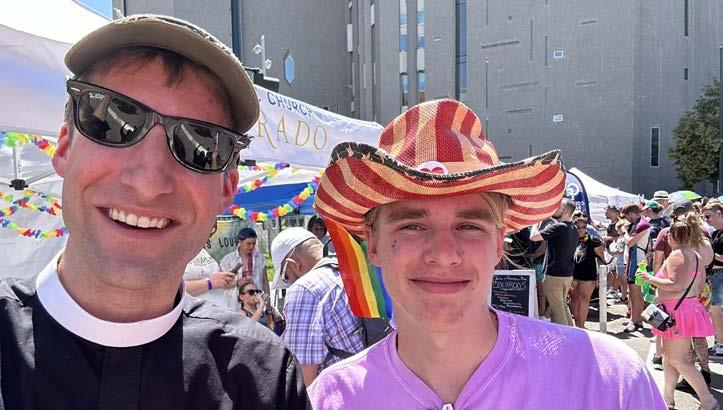
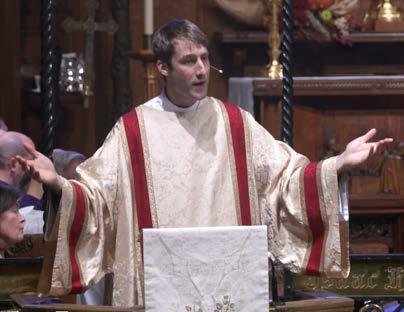
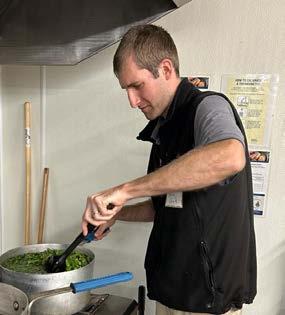
GOSPEL JUSTICE & THE DIACONATE: SERVING CHRIST IN A HURTING WORLD
BY THE REV. JACK KARN
Inbeing invited to try and define gospeljustice, I first thought that I might not be qualified to do so, but perhaps that humility lends itself to a reasonable, working definition. When I think of gospel justice, I think of Christ-centered action that rights wrongs and fosters equality among all people before God. For me, gospel justice lies at the heart of my prophetic ministry as a deacon: the ministry of servanthood.
I discovered the diaconate when I was introduced to The Episcopal Church in graduate school. I was drawn back to church after
a period of wandering in the wilderness during my early 20s, and the Sacred Order of Deacons spoke to me as my life’s true calling. I wrestled with the big question: what is the meaning and purpose of my life? I finally found rest in this musing in my relationship with God in Christ. In Jesus, I learned that I am here to serve. I am here to preach Good News. I am here to reconcile and lift up others.
My work is unique and creative. I am one of a handful of deacons in the whole Episcopal Church who serve in a full-time, salaried capacity. At Saint John’s Cathedral, I oversee several social justiceoriented ministries, including
those focused on homelessness, immigration, environmental stewardship, and racial justice. We have quarterly food, clothing, and basic needs drives, and I organize a diverse array of service projects on a monthly basis for the congregation. On Sunday mornings, I serve in worship in several ways, including reading the Gospel, bidding the Confession, and setting and clearing the Lord’s Table.
Naturally, my ministry leads me into those shadowy, oft neglected corners of our world being present with the sick, the lonely, and marginalized. God’s Justice, Gospel Justice, is made manifest in Jesus Christ, and deacons play a key role in representing Christ and the Church in our hurting world. Deacons are an extension of the ministry of bishops, and support priests in administering the sacraments.
During this time of what feels like unprecedented territory in our national dialogue, deacons like myself are called to play a key role in lifting up the moral voice of the Church. That is often more in acts of mercy than in words of proclamation, yet both are essential. I pray that we, as people of God, do not lose sight of our call to serve others, even when temptation pulls us toward closing off. I pray that we take heart and persevere in the work we have been given to do. To stand up for what we believe in and advocate for better social policies. I pray that in all our justice-seeking work, we remember God’s loving presence in our lives and eternal hope for this world.
THE REV. JACK KARN is the Deacon for Community Partnerships at Saint John’s Cathedral, Denver.
Top: The Rev. Jack Karn at the Pride Festival in Denver. Bottom: The Rev. Jack Karn
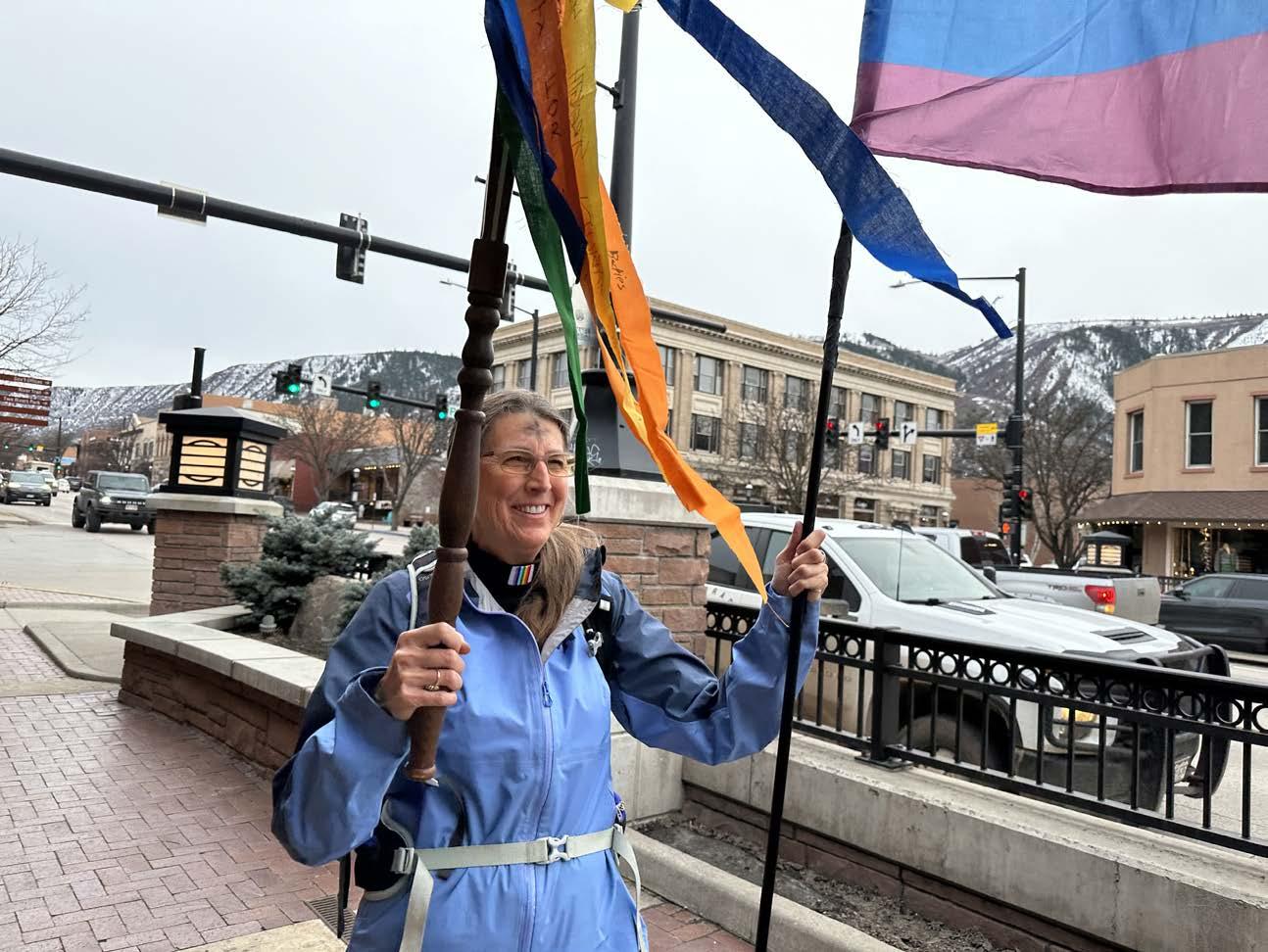
Rooted in Dust, Rising for Justice
BY THE REV. KIMBERLEE LAW
“Injustice anywhere is a threat to justice everywhere. We are caught in an inescapable network of mutuality, tied in a single garment of destiny.”
– The Rev. Dr. Martin Luther King, Jr.
Standing just inside the front door of the café, welcoming people with ashes in hand, was an incredibly moving experience. The café is a warm, inviting, locally-owned eatery and voted the best minorityowned business in Glenwood Springs, so it was the perfect location. And people were there from all walks of life and all ages. As more and more people poured in, many of whom I didn’t know, the energy
continued to build, and I was close to tears with the large turnout.
Planning for the ecumenical Ash Wednesday gathering started over breakfast and after swim class. The Methodist pastor, the Rev. Rebecca Dunagan, and I had been swimming together as we are both training for triathlons this coming summer. We invited our local colleagues, Lutheran
The Rev. Kimberlee Law marching for Justice in Glenwood Springs on Ash Wednesday.
Photo courtesy Dan Harbour
pastor the Rev. Jeff Carlson and Presbyterian pastor the Rev. Bruce McBurney, for breakfast and Lenten planning. Our congregations work together each year, holding joint services on special holy days.
Over breakfast, the conversation was about how Lent and Ash Wednesday would be different this year. With all of the division in our country and how rights are being taken away from women, LGBTQIA+, immigrants, black and brown people, and the earth itself, it became clear we didn’t want to do “Lent as usual.” When Pr. Jeff Carlson suggested a Walk for Justice, both Pr. Rebecca and I looked at each other with tears in our eyes. Yes, this felt like it would meet the moment we are in.
A couple of meetings later, we had a loose plan that continued to evolve. We all thought it was important to reach out to those in our community who didn’t attend our churches and may have been hurt by institutions, including the Church. We wanted to invite the public and anyone who cared about justice and helping our neighbors who are vulnerable and marginalized. We all agreed a neutral location was key. We ended up at the Bluebird Café in downtown
Glenwood Springs. They hosted us from 4:00 to 5:30 pm for no charge. Rather than a worship service, we wanted to offer self-guided stations, a grounding event prior to the Walk for Justice, so people could come and go as they pleased.
Pr. Jeff Carlson was the creative mind behind the stations, and those stations were:
1. Receiving Ashes – Two options were available, either a cross with the traditional wording, “Remember you are dust and to dust you shall return,” or a bow (like a rainbow) with the words, “Remember you are stardust, and to stardust you shall return.”
2. Lament & Accountability Station – At this station, people were invited to acknowledge their fears, anger, and/or confess their failings, writing them down on different colored strips of cloth. These colorful strips of cloth were then wrapped around two different crosses that were carried during the Walk for Justice, one cross leading the process and the other cross at the end of the procession.
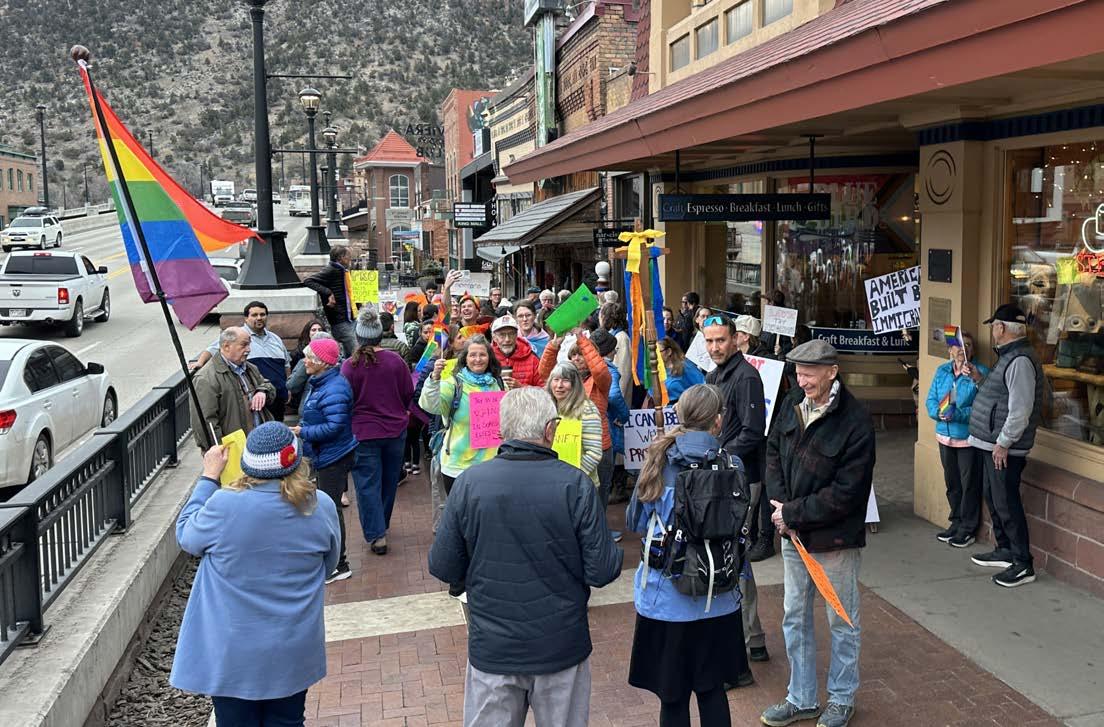
Participants gather for the Walk for Justice on Ash Wednesday in Glenwood Springs. Photo courtesy Dan Harbour
3. Contemplation/Meditation Station – This was a centering station to focus our hearts and minds and aid us in speaking in calming and clearminded ways. People were encouraged to pray and meditate with whatever was on their hearts, and various prayers were provided, including the Prayer for Sound Government in the Book of Common Prayer (p. 821).
4. Inspiration Encounter Station – Pr. Jeff Carlson created a video of “wise and courageous people who have faced devastating circumstances to offer us words of hope.” The video highlighted marginalized voices, including those of Indigenous, Women, Black, and LGBTQIA+ leaders.
5. Commitment To Action Station – At this station, people had several options to take action to further justice and mercy, acknowledging that facing difficulties together helps us feel less isolated and not so alone. A whiteboard was available to write down where help was needed in the community, inviting people to take action. One option was an upcoming library district meeting to stand with LGBTQIA+ youth who are losing access to literature. Folks could also make a PRO-test sign to carry for our Walk for Justice, and several examples were provided. We encouraged positive-leaning signs, rather than “anti,” like antiracism, anticorruption…
The Walk for Justice took place from 5:30-6:00 pm, and everyone was welcome to join in if they had attended the grounding event prior or not. We walked south on Grand Avenue about a ½ mile to Sayre Park during the busiest time of the day when workers are heading home from Aspen. This was a peaceful protest, and we walked without chanting or shouting but received car horns honking in encouragement. If anyone intended to send hate our way, protesters were encouraged to respond with a smile, friendly wave, and send a prayer of kindness their way.
My clergy colleagues and I had conversations about what would happen if only a few people came or if we had so many people that it would be difficult to be welcoming. All of us were delighted with the response from our small mountain community, with about 150 people or so walking for justice and articles in two local newspapers.
It felt good to do something to counter all the negativity and hate from national news headlines
Coming together in the spirit of justice, compassion, and love… is something we want to continue to stand up for.
we see these days. Coming together in the spirit of justice, compassion, and love, accompanying those being targeted, is something we want to continue to stand up for, making our voices heard about the Way of Love and the Christ we follow, who is nothing but loving, liberating, and life-giving. The Gospel continues calling us to stand up for our beliefs.
My colleagues and I are meeting again the first week of April to prayerfully consider how we can continue these efforts and where the Spirit will lead us on Good Friday, another time we traditionally come together with an ecumenical service.
This Ash Wednesday gathering at the Bluebird Café was more than a liturgical experiment—it was the Gospel in action. It was a visible, tangible response to Jesus’ call to love our neighbors, confront injustice, and accompany the vulnerable with compassion and courage. Rooted in our Christian identity and shaped by our shared longing for healing and wholeness, we chose to mark the beginning of Lent not with ritual alone, but with justice-centered discipleship. In doing so, we began to redefine what it means to live Gospel Justice not as a distant theological concept, but as a lived reality in our mountain town. From ashes to action, from lament to hope, our community walked together in the Way of Love, embodying the radical mercy and liberating love of Christ in a world aching for both.
THE REV. KIMBERLEE LAW is the Partnership Vicar of The Episcopal Church in Garfield County: St. Barnabas, Glenwood Springs; St. John’s, New Castle; & All Saints, Battlement Mesa.

THE GOSPEL IN ACTION: BRINGING HOPE & PREVENTING SUICIDE
BY DAVID GALVAN
Henry David Thoreau once wrote, “The great masses of men lead lives of quiet desperation.” I hope that we move beyond quiet desperation to honest conversations about suicide within the Church. In a world where despair often drowns out hope, the call to live out Gospel justice is more urgent than ever. As followers of Christ, we are summoned to be bearers of light in the darkest corners of human suffering—including the reality of suicide. The Gospel calls us not just to recognize this crisis but to respond with the justice, mercy, and compassion of Christ.
THE CRISIS OF SUICIDE: A CALL TO ACTION
The statistics on suicide are staggering. According to the CDC, suicide rates have been on the rise, affecting every demographic and community. Over 70% of suicides in America involve middle-aged white males. It is the second leading cause of death among young people and disproportionately impacts marginalized populations, including LGBTQIA+ youth, veterans, and those struggling with severe mental health challenges. Yet, suicide is more than a statistic—it is a deeply human crisis often connected to
loss and identity.
Every person is created in the image of God, inherently valuable and worthy of love. If we take seriously Jesus’ call to care for the least of these (Matthew 25:40), then suicide prevention must be part of our understanding of Gospel justice. It is not simply a mental health issue; it is a justice issue—one that demands our faithful response.
To illustrate, imagine traveling the road from Jericho to Jerusalem weekly, only to find another halfdead person on the roadside each time. You can tend to their wounds and get them to safety, but at some point, shouldn’t we ask, “What’s wrong with the road?” Why do people keep falling into ditches? Shouldn’t we repair the road itself? Suicide prevention requires us to ask these systemic questions—about access to care, stigma, and the societal conditions that contribute to despair.
THE ROLE OF THE CHURCH: A COMMUNITY OF HOPE
The Church is called to be a sanctuary of hope, a place where individuals facing despair can find refuge, belonging, and lifesaving support. Yet, many faith communities struggle with how to minister to those experiencing suicidal desperation. Silence, stigma, and theological/ministry misunderstandings often prevent meaningful conversations and compassionate action.
So, how can the Church live out Gospel justice in this realm?
• Break the Silence – Jesus engaged with those experiencing despair—the
The work of suicide prevention is the work of the Church. It is Gospel Justice in action.
lepers, the woman with the issue of blood, the outcasts, and the suffering. We are called to do the same by fostering open conversations about mental health and suicide in our congregations. This means normalizing discussions from the pulpit, offering pastoral care training, and equipping the faith community to respond effectively.
• Be a Soul-Safe Community –The Church should be a place where people feel safe to share their struggles without fear of judgment. We can cultivate this through our everyday work and life by embracing a culture of deep listening, ensuring that our language and ministry reflect God’s boundless love, and actively supporting those in crisis—creating what is known as a Soul-Safe Community.
• Offer Tangible Support –Faith in action means turning compassion into practical solutions. Churches can take an active role in suicide prevention by hosting Soul Shop Workshops (reach out to me at david@soulshopmovement.org to learn more), partnering with crisis response organizations, and curating a comprehensive resource list that includes crisis support lines, mental health professionals, and local counseling services. By providing education, direct support, and accessible pathways to care, we reflect Christ’s love in ways that bring
real help, hope, and healing to those in crisis.
• Advocate for Systemic Change –Gospel justice calls us beyond individual acts of mercy to structural transformation. Suicide prevention requires addressing larger societal inequities and working to end things that cause suffering. As faith communities, we must advocate for policies that ensure mental health resources are accessible to all, particularly the most vulnerable.
THE THEOLOGY OF HOPE: A LIFELINE FOR THE DESPAIRING
One of the most dangerous myths surrounding suicide is the idea that faith alone should be enough to “cure” someone. When individuals do not experience immediate healing, they may feel shame or spiritual failure. However, the Gospel reveals a different narrative—one where God meets us in our suffering rather than expecting us to rise above it on our own. Consider the “valley of the shadow of death” in Psalm 23. The psalmist walks through it, not around it.
Jesus himself experienced deep anguish and despair. In the Garden of Gethsemane, he was overwhelmed with sorrow to the point of death (Matthew 26:38). On the cross, he cried out, “My God, my God, why have you forsaken me?” (Matthew 27:46). These moments remind us that
despair is not a sign of weak faith but a reality of human existence. Yet, Jesus’ story does not end in suffering—resurrection is the final word. As followers of Christ, we are called to be the hands and feet of that resurrection hope in the lives of those who are experiencing suicidal desperation.
A GOSPEL OF LIFE
The work of suicide prevention is the work of the Church. It is GospelJustice in action. It feeds the hungry, comforts the grieving, advocates for the marginalized, and proclaims that all life is sacred. It is standing in the gap for those who feel alone, ensuring they know they belong, and offering the radical love of Christ.
As we engage in this holy work, may we remember that our mission is not just to prevent death but to create a Church where no one loses hope and no one is alone.
For those struggling, you are not alone. For those mourning, God grieves with you. And for the Church, the call is clear: be a beacon of hope, an advocate for justice, and a witness to the truth that no one is beyond the reach of love. Hope be with you.
If you or someone you know is in crisis, please reach out for help. The 988 Suicide & Crisis Lifeline is available 24/7.
DAVID GALVAN is a member of St. Michael’s Episcopal Church in Colorado Springs.
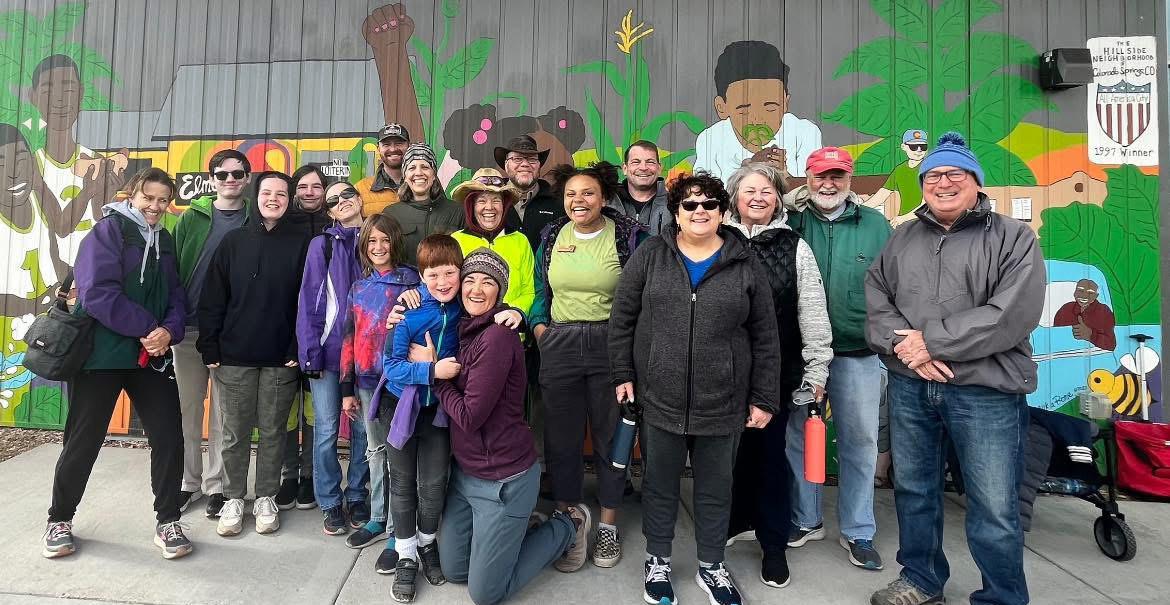

Let All the Earth Rejoice: Living Out Creation Care
BY JON NUMAIR
Afew years ago, as I was approaching my retirement (round 2) and trying to figure out what I would do with my time, I asked to meet with our pastor. I was fairly new to St. Michael’s; the Rev. Matt Holcombe and I hardly knew each other. Although I wasn’t sure what I would do or how my time would be spent, I knew I wanted to do more in our parish than attend Sunday services. Matt quickly responded to my request, and we met at my favorite local breakfast dive to explore the possibilities.
Matt asked about my background, work, and volunteer work. In not too much time, we both latched on to some environmental concerns work I had initiated at a previous church. We acknowledged a void in our otherwise robust Outreach and Social Justice ministries when it came to justice for our planet. But what could I do? The journey began.
My faith life, which includes some surprising twists and turns, has almost always been informed by Jesus’ admonition to love God and love my neighbor. Over the next few months, I learned about Care of Creation ministries from many sources, including The Episcopal Church and our diocese, and how/ why it is vital not only to live out our love of God (as in giving thanks for this beautiful planet God
provided us) but also in our love for our neighbors. I learned that the fallout from the destruction of our earthly home does not fall proportionately. The fallout lands hardest on those least equipped to respond and most often on those who had nothing to do with the basis of the devastation— the marginalized, the disenfranchised. This latest twist had me thinking about climate change as a Christian imperative.
It’s not always been easy for me to live out the command to love my neighbor. I’m sure we’ve all struggled. “You mean that person, too? How can I love them?” The question becomes relatively simple for me when I consider that everyone is my neighbor: no filters, no qualifiers, no exceptions. For me, in this context, that also meant broadening the circle of the neighborhood.
My neighbors are farmers in Africa suffering the devastating effects of higher temperatures and endless drought. Indigenous peoples whose land is overwhelmed by rising ocean levels… they are my neighbors. Inner-city poor who suffer choking air and contaminated water are my neighbors.
As a Christian, I must recognize that caring for God’s people is now intertwined with caring for the rest of God’s Creation. The justice component
Top & Right: A St. Michael’s group participates in a Food for Power work day in Colorado Springs.
Photo courtesy Julie Howell
of our faith compelled me to hear the cry of the earth when I listened to the cry of the poor and vice versa. The focus of my Creation Care/Creation Justice imperative was becoming clear… and overwhelming. People are in distress all over the world due to climate change. We needed to act.
My belief in the need to act was founded in John 3:35. This well-known passage has always weighed on me, “By this everyone will know that you are my disciples, if you love one another.” If everyone were to know we were Christian by our love for one another, I felt that it had to be more than an expression. I wanted to walk the talk. I felt it had to be tangible and visible.
I researched educational opportunities because I thought that through education, we would be encouraged to act, looking for something that would join our learning with our faith. I discovered that JustFaith Ministries had an eco-justice program that fit the bill, comprised of three 8-10-week programs (Sacred Air, Sacred Land, and Sacred Water) that we could deliver, without any expertise, to a group of 8-15 parishioners.
With the help of Matt, I recruited two other parishioners to help lead the effort. Ellen and Rod enthusiastically joined the team. We selected the Sacred Water program as our first offering because we felt water was an important issue in Colorado. We promoted the program and prayed. Would anyone be interested? Would anyone be willing to commit 10 weeks to learning about water issues from a Christian perspective? The response was overwhelming. We allowed for 15 sign-ups and got 17. We didn’t want to turn anyone away, so
we knuckled down and made it work. The model created by JustFaith follows a three-part format: 1) What is going on? 2) Why is it important? and 3) What can we do about it? Our group was interested, concerned, and enthusiastic. It was a great success, and we have offered one program each spring and fall ever since.
Over the last two+ years, we have presented the whole series once and are almost through our second cycle. We have had 68 individuals complete at least one segment of the series, and 10 have completed all three programs. We have partnered with local organizations to clean up public spaces and help with their eco-justice efforts. We’ve learned from subject matter experts on air, land, and water issues, and we are walking the talk at St. Michael’s. We’ve changed almost all our lighting to LED bulbs, installed smart thermostats, and added motion-activated lighting. We’ve installed water bottle filling stations to reduce plastic bottle usage and switched to e-versions of our publications. Our food service is using more reusable or compostable utensils and dishes, and we’ve begun composting all our food waste to avoid having it rot in landfills, which creates more methane. We have Creation Care Conversations every other month, providing 90-minute educational gatherings for those who cannot commit to a long-term program.
Each Sunday, we pray for the just and proper use of God’s Creation. Through the efforts of many at St. Michael’s, we are turning that prayer into action.

As a Christian, I must recognize that caring for God’s people is now intertwined with caring for the rest of God’s Creation.
JON NUMAIR is the Social Ministries Coordinator at St. Michael’s Episcopal Church in Colorado Springs.
A St. Michael’s group cleans up trash for the Fountain Creek Watershed “Creek Week.“
Photo courtesy Jon Numair
REFLECTIONS
Several years ago, while serving as a chaplain, I arrived one Friday afternoon at the county jail. I was escorted to a large, mediumsecurity communal dorm and recreation room where 15 inmates and an officer were present.
Like all the hallways and meeting rooms in this jail, the space was lit by harsh overhead fluorescent lights and painted institutional gray— choices made in the interest of minimizing cost and avoiding embellishment.
Lining the opposite walls of the room were connected clusters of twenty exposed open sleeping cubicles. Each contained a tidy cot with a pillow and blanket tucked in with military precision. In the center of the room, several heavy metal game tables, each with four attached seats, were bolted to the floor—used for playing cards, eating meals, or having conversation.
The room had a strict, military-style ambiance— no frills, clean, and completely uncluttered. What struck me most was that the officer in charge of all these men was a small woman. Yet it was clear she was both respected and beloved. She clearly wouldn’t tolerate misbehavior, but she wasn’t resented, as some punitive officers are. I could tell she had heart. I wondered if she served as a mother figure to some of these wounded and lost men.
In a rare open space, several inmates quickly arranged fifteen metal folding chairs around a makeshift wooden table that could have passed for an altar. Two men handed out fliers I had brought with excerpts from the Book of Common Prayer’s chapel service, including the day’s biblical readings.
We began the service by checking in: “How are things here for you today?” The mood was surprisingly upbeat. We started with the Prayers of the People—literally. Around the room, men shared prayers of gratitude, requests for help with known troubles, and even prayers for the officer herself. Then we moved to the Scripture readings: the Psalms, an Epistle, and the Old Testament.
Think of Jesus as a burning coal—so that we can radiate His warmth throughout the week, even to those who treat us harshly.
When it came time for the Gospel reading, two men gently pulled another inmate—a fragile, spastic man—from his seat and nudged him forward. “He’s going to read the Gospel today,” they insisted. The man protested, saying he couldn’t read—he was nearly illiterate, possibly developmentally delayed. But the two who had brought him up stuck with him, encouraged him, and together they managed to get through the reading. When he finished, the entire room stood up and cheered. He was visibly embarrassed but also deeply moved by their support.
We discussed the themes of the day’s readings in a round-robin style, sharing how we each felt the Spirit of God was speaking to us through the texts.
Then we celebrated the Eucharist. For those unfamiliar with it, I explained simply: “Today, we are taking the body of the merciful Jesus into our own bodies. Think of Jesus as a burning coal—so that we can radiate His warmth throughout the week, even to those who treat us harshly.”
In the weeks that followed, it became clear—as it was on that day—that this is exactly what they did.
THE
REV. SANDY BLAKE is the Assisting Priest at St. Luke’s Episcopal Church, Denver.
St.Stephen’s in Longmont began an outreach ministry with a Little Food Pantry (LFP), located on the street in front of the church, as part of an Eagle Scout project. A committee was then formed to develop a plan to make the ministry sustainable. St. Stephen’s Little Food Pantry is one part of our “Opening Our Doors” outreach.
The LFP offers shelf-stable food, hygiene items, and diapers to anyone in need. It also provides a space where the entire neighborhood can donate and share with others. Our generous St. Stephen’s family continues to support the pantry every week by donating items listed in Pathways E-News as the greatest needs for the month. We also have a team of faithful volunteers who stock the LFP twice each week and restock supplies as needed.
We are deeply grateful to our congregation and community for their ongoing support—especially during our major food drives in August and November.
This week, I experienced Christ in action—and I am truly humbled and grateful:
I was at the Walmart on North Main Street in Longmont. As I checked out, the cashier and I noticed a family at the next register putting items back because they didn’t have enough money. Both of us felt terrible. I shared with my cashier, Carmen, about the Little Food Pantry and explained that it runs entirely on donations. I also mentioned that I was purchasing a bunch of travelsize hygiene products for it.
Carmen asked if she could donate to the pantry. I thanked her sincerely and said yes. She asked for my phone number so she could call me when she was ready. A few days later, she called and said she had some items and asked if I could meet her at Starbucks in the ACE parking lot on North Main. She explained that she doesn’t drive and that it was close enough for her to walk. I offered to pick up the items from her home, but she preferred to meet at Starbucks—perhaps she didn’t want me to know where she lives.
I was deeply moved by her generosity. Carmen carried enough travel-size hygiene items to make six complete sets, including shampoo, lotion, deodorant, toothpaste, toothbrushes, shaving cream, and more. She walked at least six blocks to deliver them—gifts for people facing financial hardship. I believe she waited until her payday to purchase the items.
Her act reminds me of the story from the Gospel of Luke about the widow’s mite—how she gave all she had. Carmen gave from her heart, living out Christ’s command to “love your neighbor.” Her generosity is a powerful reminder that God’s love is present in our world, expressed through people in all kinds of circumstances.
GAY HAMPTON is a parishioner at St. Stephen’s Episcopal Church, Longmont.
This April, a 33-year tradition will resume as five parishioners from St. Michael’s Episcopal Church in Colorado Springs travel to the Colorado Territorial Prison in Cañon City. Over a four-day weekend, they will share the Word of God and offer encouragement to those incarcerated.
This ministry, known as Kairos Inside, seeks to build a Christian community within prison walls. St. Michael’s is part of an ecumenical team that brings Christ’s love, support, and hope to inmates. Deacon Gary Darress describes it as “a short course in Christianity—inside prison.”
The Rev. Gary Darress and a dedicated group of men from St. Michael’s (alongside a parallel women’s Kairos team that visits women’s correctional facilities) will join approximately 20 volunteers from various denominations. Together, they will meet with about 30 inmates to pray, listen to Scripture and spiritual talks, share reflections, create artwork expressing their faith, and break bread—literally and spiritually—forming a Christian community within prison walls. To honor the dignity of those they serve, the team will provide meals from local restaurants—offering a welcome break from the daily institutional fare.
These intensive Kairos weekends, paused during the COVID-19 pandemic, will now resume twice a year. In addition, St. Michael’s continues to support monthly Kairos visits to remind inmates they are not forgotten—and to share the life-changing message of Jesus Christ’s love and forgiveness.
The Kairos prison ministry is a powerful example of Gospel justice in action—bringing Christ’s love and hope to those often overlooked. Through presence and compassion, St. Michael’s parishioners live out the call to active discipleship, reminding us that justice begins with relationship and the courage to show up.
JON NUMAIR is the Social Ministries Coordinator at St. Michael’s Episcopal Church, Colorado Springs.
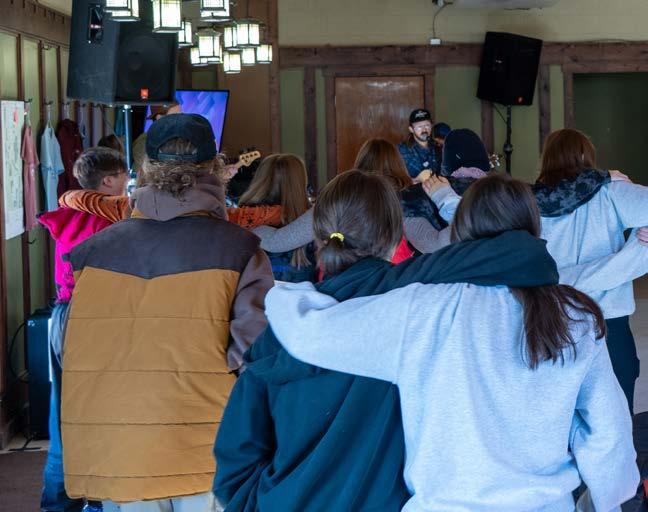
The Kairos prison ministry is a powerful example of Gospel justice in action— bringing Christ’s love and hope to those often overlooked. Through presence and compassion, St. Michael’s parishioners live out the call to active discipleship, reminding us that justice begins with relationship and the courage to show up.
PERSPECTIVES
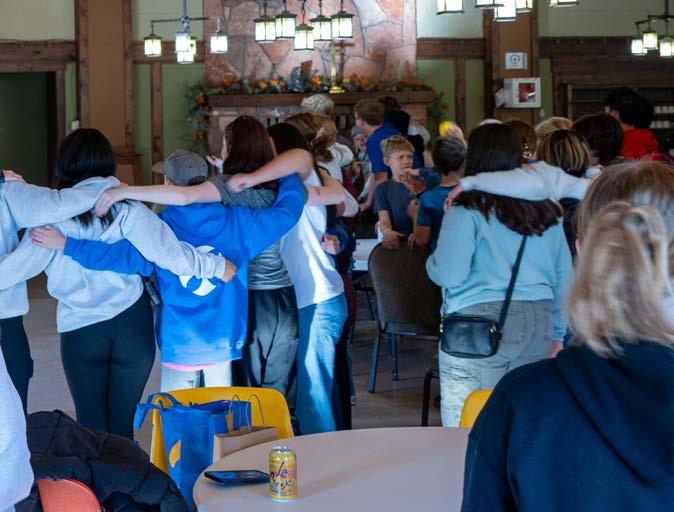
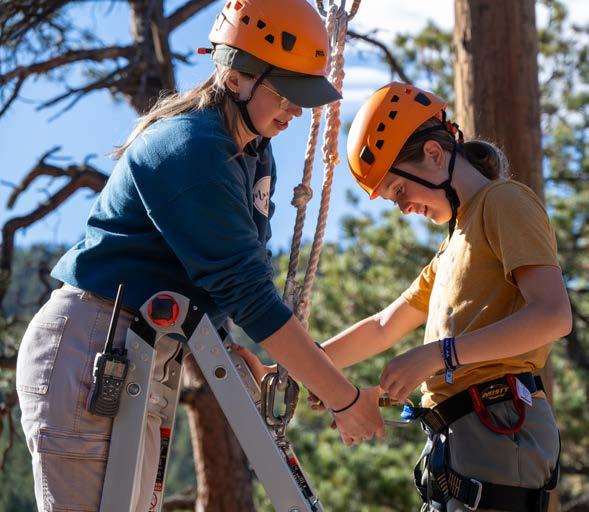
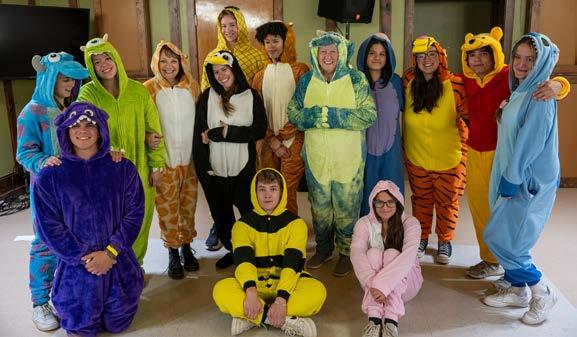
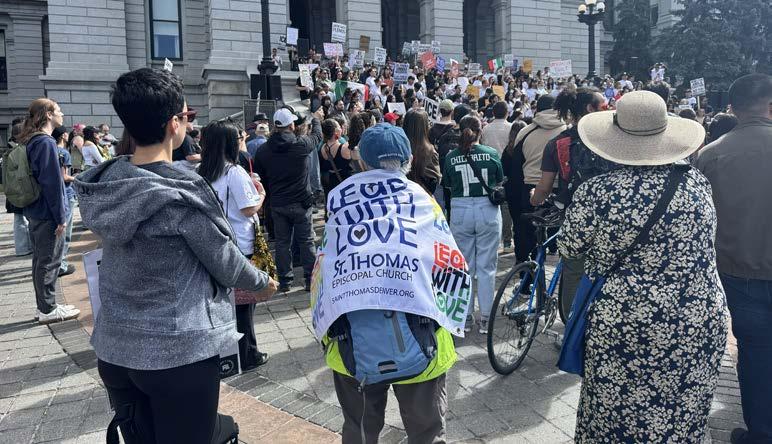
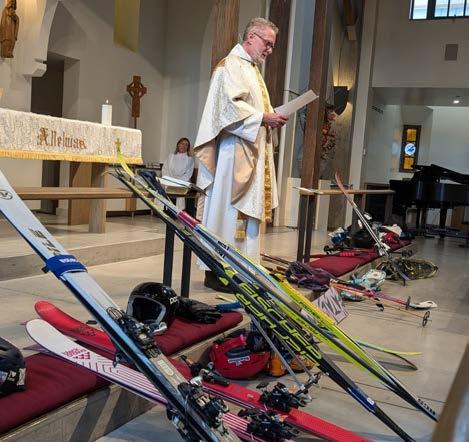
Top Left: Quest Youth at Cathedral Ridge gather for worship.
Top Right: A Quest participant at the ropes course at Cathedral Ridge. Left: Quest leaders have fun in onesies.
Photos courtesy Elizabeth Cervasio
Bottom Left: Parishioners from St. George, Leadville; St. Andrew’s, Denver; and St. Thomas, Denver participate in a march for justice at the Colorado Capitol. Photo courtesy the Rev. Terri Hobart
Bottom Right: Blessing of the Skis & Winter Sports at St. Paul’s, Steamboat with the Rev. Jeremy Lucas. Photo courtesy June O’Neill
BISHOP & DIOCE SE

